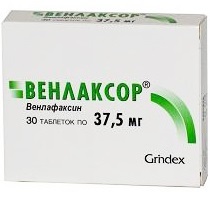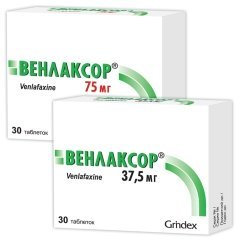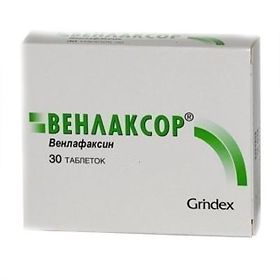 Venlaxor in its structure to any existing group of antidepressants does not apply.
Venlaxor in its structure to any existing group of antidepressants does not apply.
Antidepressant therapeutic effect and mechanism of action on the body and is due to its ability to enhance the transmission of nerve impulses. Both the active substance itself and its metabolite EFA are inhibitors of the reuptake of serotonin and norepinephrine and weak inhibitors of dopamine uptake.
On this page you will find all information about VENLAXOR: the full instruction on the application for this medicine medium, average prices in pharmacies, complete and incomplete analogs of the drug, as well as reviews of people who have already applied Venlaksor. Want to leave your opinion? Please write in the comments.
Clinical and pharmacological group
Antidepressant.
Conditions of leave from pharmacies
It is released on prescription.
Price list
How much does Venlaksor cost? The average price in pharmacies is at the level of620 rubles.
.Form of issue and composition
Tablets of 3, and 75 mg of flat-cylindrical form of light pink in Blister No. 10 in a cardboard pack of 3 blisters.
- The main active ingredient is venlafaxine hydrochloride.
- Auxiliary components: anhydrous calcium hydrogenphosphate, anhydrous lactose, sodium carboxymethyl starch, magnesium stearate, colloidal anhydrous silicon dioxide, iron oxide red dye.
Pharmacological effect
Venlaksor (venlafaxine) refers to the preparations of the group of antidepressants, derivatives of phenylethylamine, also has an anti-anxiety effect. The chemical structure and pharmacological properties are different from other known antidepressants - tricyclic and tetracyclic, as well as from the anxiolytic means.
The mechanism of action of venlafaxine is not fully understood, at the moment its action is associated with the potentiation of neurotransmitter activity in the central nervous system (CNS). Venlafaxine and its active metabolite, orthodesmethylvenlafaxine, inhibit reverse neuronal seizure of serotonin and norepinephrine in serotonergic and adrenergic synapses of the central nervous system, to a lesser extent - reverse capture of dopamine in dopaminergic synapses.
In vitro studies revealed that venlafaxine has a slight affinity for M-cholinergic receptors, Hi-histamine-receptors and alpha-1-adrenergic receptors. The drug is suitable for long-term therapy.
Indications for use
What helps Venlaksor? These are various forms of depression, including those associated with anxiety. Specific forms of anxiety, including those requiring long-term treatment. Social phobias and generalized anxiety, including those requiring long-term treatment.
Attacks of panic with or without agoraphobia, including those requiring long-term treatment. For the prevention of recurrence of attacks or new episodes of depression.

Contraindications
Absolute contraindications:
- Age restriction up to 18 years (effectiveness and safety not proven);
- Pregnancy (possible pregnancy);
- Lactation period;
- Individual intolerance to the active components of the drug;
- Renal dysfunction of severe degree (GFR less than 10 ml / min);
- Severe insufficiency of hepatic function;
- Simultaneous therapy with MAO inhibitors.
Patients with recent heart attacks, angina, increased blood pressure, tachycardia, a history of convulsive syndrome, increased intraocular pressure, zakratougolnoy glaucoma, the presence of recorded manic conditions in the past, a predisposition to bleeding mucous membranes, a reduced body weight, hypovolemia, hyponatremia, taking diuretics concomitantly with venlaxor therapy, suicidal tendencies, hepatic and renal insufficiency should be prescribed therapy with with extreme caution.
Instructions for use
The instructions for use indicate that Venlaxor is taken orally twice a day during meals.
- The daily dose is 75 mg (3, mg, morning and evening).
- If after 2-3 weeks of significant improvement is not observed - you can increase the daily dose to 150 mg.
- When treating a more severe depressive condition and the need for higher doses of the drug - you can start treatment immediately with 75mg twice a day. The amount of the drug per day can be increased by 75 mg every 2-3 days, until the desired effect of treatment is achieved.
- The maximum dose of the drug per day is 375 mg. When the desired result of treatment is achieved, it is necessary to gradually lower the dose of the drug to a minimum.
- Preventive maintenance and maintenance therapy can be carried out within half a year or more. In this case, the minimum dosage of the drug is prescribed.
Dosages for specific patient groups:
- In case of mild renal insufficiency (GFR more than 30 ml / min) correction of the dosing regimen is not required. For renal failure of moderate severity (GFR 10-30 ml / min), the dose should be reduced by 25-50%. In connection with the elongation of venlafaxine T1 / 2 and its active metabolite EFA, such patients should take the entire dose 1 time / day. It is not recommended to use venlafaxine for severe renal insufficiency (GFR less than 10 ml / min), as there is no reliable data on such therapy. Patients on hemodialysis are given 50% of the usual daily dose of venlafaxine after completion of hemodialysis.
- Older patients do not need a dose change, but care must be taken, for example, because of the possibility of impaired renal function. The lowest effective dose should be used. When the dose is raised, the patient should be under careful medical supervision.
- With mild hepatic insufficiency (prothrombin time / MF / less than 14 s), correction of the dosing regimen is not required. With moderate hepatic insufficiency (IV 14 to 18 sec), the dose should be reduced by 50%. It is not recommended to use venlafaxine in severe hepatic insufficiency, since there are no reliable data on such therapy.
Discontinuation of the drug
At the end of taking the drug VLL, it is recommended to gradually reduce the dose of the drug, at least in for a week and observe the patient's condition in order to minimize the risk associated with cancellation preparation.
The period required to completely stop the drug depends on its dose, duration of treatment and individual patient characteristics.
Side effects
The occurrence and severity of side effects mainly depends on the dosage of the drug. In the case of a prolonged therapeutic course, the frequency of most of the effects and their severity is significantly reduced. In the overwhelming majority of cases, there is no need to abolish therapy.
- Organs of hematopoiesis: in a few cases, the appearance of agranulocytosis, neutropenia, aplastic anemia, pancytopenia.
- Gastrointestinal tract: often there is vomiting, nausea, loss of appetite. More rarely - bruxism, an increase in the activity of liver transaminases. In rare cases, the appearance of hepatitis.
- Cardiovascular system: often there is an increase in the numbers of blood pressure, hyperemia. More rarely arterial hypotension, rapid heart rate. Very rarely there is a pathological change in the QT-interval on the cardiogram, ventricular fibrillation, ventricular fibrillation.
- Sense organs: the most common side effects are a violation of accommodation, reduction in visual acuity, mydriasis. Rarely there is a taste disorder in the form of distortion of taste sensation or its distortion.
- Genitourinary system: often noted decrease in sexual desire, erectile and ejaculatory disorders, menorrhagia, anorgasmia. Among the rare side effects are disorders of urination, female anorgasmia.
- Central nervous system: when using Venlaxor, asthenic conditions can often occur, insomnia, dizziness, frightening dreams, increased nervous excitability, trembling in the muscles, increased muscular tone. More rare are hallucinations, apathy, fainting. Very rarely there are convulsions, various manic disorders, neuroleptic syndrome.
Other side effects: often there is a loss of body weight of patients, increased sweating (mainly night). Among infrequent conditions - an increase in mass, ecchymosis. Rarely there is a serotonin syndrome (abdominal pain, diarrhea, nausea, vomiting, hyperthermia, psychomotor agitation, tachycardia, rigidity of muscles, myoclonic cramps, increased sweating, depression of consciousness), as well as the syndrome of inadequate release of ADH. After the termination or ending of therapy occurrence of an abstinent syndrome is possible. In this case, the following symptoms may appear: headaches, dizziness, asthenic conditions, decreased efficiency, sleep disturbances, anxiety, hypomania, increased nervous excitability, depression of consciousness in the form of confusion, violation of skin sensitivity, increased sweating, suppression of appetite, dyspepsia disorder. Most of these symptoms are of minor severity and do not require specific therapy.
Allergic reactions: are observed infrequently. Among them - anaphylactic states, polyiform exudative erythema. Clinical indicators: refer to rare side effects in the treatment of Venlaxor. Mainly it is thrombocytopenia, hyponatremia, prolongation of bleeding time. With prolonged course of therapy using high dosages of the drug, the occurrence of hypercholesterolemia is possible.
Overdose
Overdose of the drug is indicated by the following symptoms:
- convulsions;
- change in the state of consciousness in the form of somnolence;
- alteration of the electrocardiogram, such as an extended QT interval, blockage of one or both legs of the bundle, the extension of the QRS complex;
- ventricular tachycardia, hypotension, bradycardia
When treating Venlacsor, alcohol and other psychotropic drugs are not recommended, since, with an overdose of the drug and the use of the aforementioned substances, cases of lethal outcome are known.
Assistance with overdose: the reception of activated charcoal to reduce the absorption of the active substance Venlaksor. Summoning a vomiting reflex is not recommended. Special antidotes are not defined. The patient is recommended to consult a specialist who will conduct continuous monitoring of breathing and other vital functions of the body. The active substance of the drug and its metabolites EFA are not eliminated from the body during dialysis.
special instructions
During the appointment and use of Venlaxor it is important to consider:
- At the initial stages of treatment, the probability of suicide attempts is not ruled out, so the patient should be under constant supervision;
- During treatment in elderly patients, dizziness may occur, imbalance;
- During treatment, constant monitoring of blood pressure is necessary (especially when selecting / increasing doses);
- During therapy, you should not drink alcohol;
- In severe hepatic impairment Venlaxor is not recommended;
- With mild hepatic insufficiency, dose adjustments are not required;
- With moderate hepatic insufficiency the therapeutic dose is reduced by 50%;
- With mild renal failure, dose adjustments are not required;
- With moderate renal failure, the half-life in
- When prescribing the drug to patients with lactose intolerance, it is important to take into account the content of lactose in tablets;
- In patients with cirrhosis of the liver, the concentration of venlafaxine and EFA in the blood plasma increases, and the rate of excretion decreases;
- enlafaxine increases, so the therapeutic dose should be reduced by 25-50%, while the whole daily dose is taken once;
- In severe renal failure Venlaksor is not recommended;
- Since the drug affects the central nervous system, during treatment it is better not to commit potentially dangerous Activities requiring speed of reaction and concentration of attention (driving, management of machinery and etc.);
- Elderly, the drug is administered with caution, at the lowest effective dosages because of the high probability of impaired renal function;
- In patients with affective disorders, the likelihood of developing manic conditions is possible (patients with a history of mania must be under constant medical supervision);
- At the final stage of treatment, the dosage of Venlaxor should decrease gradually for at least 7 days in order to avoid withdrawal syndrome;
The period necessary for the complete cessation of venlaxor intake is set individually for each patient based on the applied doses of the drug, the duration of the therapeutic course and individual characteristics patient.

Drug Interactions
- Venlafaxine can help increase the concentration of haloperidol, because of which it is possible to increase its effect.
- Caution should be exercised when using drugs that inhibit the isoenzyme CYP2D6 or CYP3A4.
- Venlaxor changes the pharmacokinetics of indinavir (the total concentration decreases by 28%, the maximum by 36%), enhances the effect of ethanol on psychomotor reactions and anticoagulant effect of warfarin, can increase the concentration in blood plasma of clozapine and enhance its side effects (including epileptic seizures).
- Venlaxor is contraindicated in the period of application of MAO inhibitors. After their cancellation, at least 14 days must pass, with the exception of moclobemide, in which case 24 hours are sufficient. MAO inhibitors can be used 7 days after the cancellation of Venlaxor.
Reviews
Reviews on the action of the drug in prolonged severe depressive states with phenomenaapathetic, anhedonia, longing, obsessive states are in most cases positive. Patients noted improvement in mood, appearance of appetite, strength, restoration of perception of reality.
Some patients complain of poor drug tolerance and side effects. For a more thorough examination of the effectiveness of the drug should read reviews of Venlaksor on the forums, there are comments of experts.
Analogues
Analogues of the drug - Velaxin, Velafax MB, Venlafaxine, Newvelong, Venzuert, Dapfix, Epevelon, Epevelon retard.
Before using analogues, consult your doctor.
Storage conditions and shelf life

How to choose probiotics for the intestine: a list of drugs.

Effective and inexpensive cough syrups for children and adults.

Modern non-steroidal anti-inflammatory drugs.

Review of tablets from the increased pressure of the new generation.
 Antiviral drugs are inexpensive and effective.
Antiviral drugs are inexpensive and effective.


